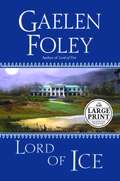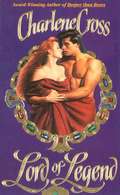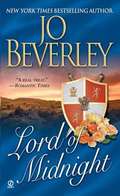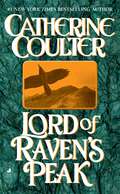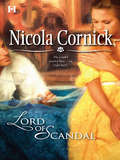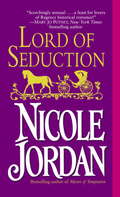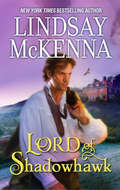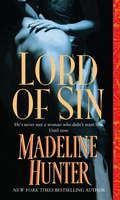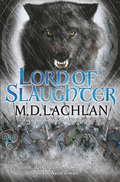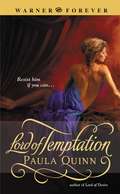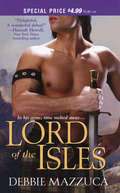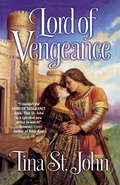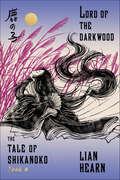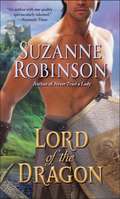- Table View
- List View
Lord of Ice (Knight Miscellany #3)
by Gaelen FoleyCelebrated as an extraordinary new talent in romance, Gaelen Foley astounds readers with her vibrant stories of passion and adventure. Now, hot on the heels of her daring Lord of Fire, she spins the powerful tale of a hero tempted by the one woman he is forbidden to love. . . . Damien Knight, the earl of Winterley, is proud, aloof, and tormented by memories of war. Though living in seclusion, he is named guardian to a fellow officer’s ward. Instead of the young homeless waif he was expecting, however, Miranda FitzHubert is a stunning, passionate beauty who invades his sanctuary and forces him back into society. Struggling to maintain honor and self-control, Damien now faces an even greater threat: desire.A bold, free spirit, Miranda has witnessed the darkest depths of Damien’s soul–and has seen his desperate need for love. But before she can thaw his unyielding heart, she must endure a terrifying nightmare of her own. . . .
Lord of Legend
by Charlene CrossThe hawk swooping after a female sparrow near her castle sent a chill of foreboding through lovely Chandra Morgan, Lady Lochlaigh. Legend said the ladybird would feel the hawk's talons in her heart as he carried her away. Chandra, young chieftain of the Morgans, felt her fears growing for her cherished heather-covered land with its warring clans, and the omen of the hawk began to haunt her soul.... Cold and wet to the bone, Alexander Hawke, Lord Montbourne, cursed his misfortune at being sent to the godforsaken Northern Highlands. The king himself had appointed Aleck guardian of Lady Lochlaigh and ordered him to find her a husband loyal to the Crown. Now, as Castle Lochlaigh stood gray and hostile before him, his infamous temper ignited at the clansmen barring his entrance, but far hotter feelings quickly flared when he beheld Chandra Morgan's flashing eyes. Chandra knew that here was the hawk of legend come to snare her, yet all her cunning couldn't stop the desire running like fire in her blood ... or the kisses that would brand her a traitor if she surrendered to his love ....
Lord of Lies
by Amy Sandas"You do strange things to me, Dell Turner. Tell me I am not alone in what I feel." His voice was low and rough. His eyes burned. "You are not alone," he said.Portia Chadwick knows she'll never have a life of adventure. But when a dangerous moneylender kidnaps her sister, Portia seeks help from a man known only as Nightshade. Soon she finds herself charging headfirst into his world of intrigue and danger—and unexpected passion.Dell Turner grew up in London's back alleys and gin lanes. Vowing to escape his low beginnings, he hires himself out to society's elite. When he accepts a job from a beautiful young lady, he doesn't anticipate her relentless determination to join his mad occupation...or her unnerving ability to inspire emotions he thought long buried. She's as dangerous to him as his world is to her, and yet Dell can't bring himself to turn Portia away... even if it means risking her life.Fallen Ladies series: Luck Is No Lady (Book 1) The Untouchable Earl (Book 2) Lord of Lies (Book 3) What Reviewers are saying: "Smart and Sexy."—Booklist for Luck is No Lady "SEXY AS SIN!"—Addicted to Romance for Luck is No Lady"Lively plot, engaging characters and heated love scenes make this a page-turner...Sandas has created a book readers will enjoy."—RT Book Reviews for Luck is No Lady
Lord of Lyonsbridge
by Ana SeymourA FORBIDDEN LOVEDetermined to successfully manage the castle so newly in her care, Ellen Wakelin carried out her duties with ruthlessness. Yet she could not help seeking out the company of Connor Brand, for it was only with the mysterious horse master that she could let down her guard and be her true self.The moment he discovered Ellen Wakelin in his room, Connor knew the new mistress of Lyonsbridge would be trouble. And as the former lord, the current horse master now had a problem even more pressing than regaining his heritage-for the raven-haired beauty was driving him to distraction.
Lord of Midnight
by Jo BeverleyHer sensual, hypnotic novels have won acclaim and devoted readership. Now award-winning author Jo Beverley weaves her magic spell once more as a dark knight and a beautiful woman clash on the stormy battlefield of love in Lord of Midnight. He entered her life in the midnight darkness of a storm, in the shadow of her beloved father's death. A rebellion had left Clarence of Summerbourne dead -- his castle and his daughter, Claire, forfeit to the king's champion. Renald de Lisle arrived at the castle gates as a warrior, took possession of Claire like a conqueror, and set her heart racing as her lover. Amid moonlight and velvet, she became his bride; atop tangled bedclothes she discovered passion. Then she learned Renald's terrible secret and vowed revenge against this man she had wed, this man she loved with all her heart. . . .
Lord of Pleasure
by Delilah MarvelleDesperate Times. . . It's been months since Lady Charlotte Chartwell's philandering husband met his untimely end at the hands of an angry mistress. But as miserable as he made Charlotte in life, his death proves to be an even harsher blow. For not a farthing of his fortune or estate have passed on to her, and as a ruined widow, she is destitute, penniless, and utterly without hope. Lead To Desperate Pleasures. . . Then, as Charlotte is considering the worst, a man steps into her carriage. His intentions are quite indecent at first, but the more he learns about her, the more an unfamiliar--and undesirable--emotion creeps over him. Could it be compassion? Never! For this is Alexander Baxendale, third Earl of Hawksford. He is known throughout the ton as the Lord of Pleasure, dedicated to passion, ruthless in his pursuit of sensual gratification. Yet never in all his exploits has he met a woman who could intrigue him as Charlotte does. Can this mysterious beauty make him hang up his title and see to her pleasure alone?
Lord of Raven's Peak (Viking #3)
by Catherine CoulterMerrik Haraldsson, the younger brother of Rorik, the Lord of Hawkfell Island, embarks on a journey that begins in Kiev where he comes away with two slaves--Laren and her younger brother.<P><P> Laren wants to tell stories to earn enough silver and gold to buy her and her little brother from Merik, only he refuses to sell her. And now that she's his, he must protect her when she's accused of murder, then save her yet again when he discovers her secrets.
Lord of Raven's Peak (Viking Series #2)
by Catherine CoulterThe third romance in #1 New York Times bestselling author Catherine Coulter’s Viking series. For hundreds of years the Vikings were viewed by the world as vicious plunderers and ruthless savages. But in fact, these fierce people were also great explorers. They were romantic, too; their feats those of heroes, of grit, and of valor. They were strong, proud, loyal—the stuff of legends and of fiction. Go back to Viking times with the Lord of Raven’s Peak, Merrik Haraldsson. The younger brother of Rorik, the Lord of Hawkfell Island, begins his journey in Kiev where he comes away with two slaves, but they're not who or what he thinks they are—not by a long shot. Then the question arises: Can a woman be a skald, a troubadour of Viking times? Laren, one of Merrik's slaves, is just that, and she's quite good. She wants to tell stories to earn enough silver and gold to buy her and her little brother from Merrik, only he refuses to sell her. And now that she's his, he must protect her when she's accused of murder, then save her yet again when he discovers her secrets. “Another spry Viking romance.”—Booklist
Lord of Scandal
by Nicola CornickScandalous and seductive, Hawksmoor is a notorious fortune hunter. A man women want to bed-and men want to do away with. Now he has tasted the woman of his dreams, Catherine Fenton, and he will do anything to make her his. Though heiress to eighty thousand pounds, Catherine is trapped in a gilded cage, and duty bound to a man she detests. The ton has woven a fantasy around Ben, Lord Hawksmoor, that any woman would find hard to resist, but she senses there is more to the man behind the glittering facade. She believes he can rescue her-but has she found her hero, or made a pact with the devil himselfhellip;?
Lord of Scoundrels (The Scoundrels Series #3)
by Loretta ChaseThey call him many names, but Angelic isn't one of them . . . Sebastian Ballister, the notorious Marquess of Dain, is big, bad, and dangerous to know. No respectable woman would have anything to do with the "Bane and Blight of the Ballisters"—and he wants nothing to do with respectable women. He's determined to continue doing what he does best—sin and sin again—and all that's going swimmingly, thank you . . . until the day a shop door opens and she walks in.She's too intelligent to fall for the worst man in the world . . . Jessica Trent is a determined young woman, and she's going to drag her imbecile brother off the road to ruin, no matter what it takes. If saving him—and with him, her family and future—means taking on the devil himself, she won't back down. The trouble is, the devil in question is so shockingly irresistible, and the person who needs the most saving is—herself!
Lord of Secrets
by Alyssa EverettSomewhere on the North Atlantic, 1820Rosalie Whitwell has spent most of her life sailing the globe with her adventurous father, dreaming of the day she can settle in one place long enough to have a home and family of her own. When her father suffers a fatal heart attack in the middle of the North Atlantic, Rosalie turns in her panic to a fellow passenger-the cool, reclusive Lord Deal.For years David Linney, Marquess of Deal, has avoided the society of others. Even so, he's drawn to his lovely shipmate, like him the victim of family tragedy.As the voyage nears its end, Lord Deal is compelled to propose. But on their wedding night, Rosalie gets an unwelcome surprise: her handsome husband is strangely reluctant to consummate the marriage. Does she fall short of her groom's expectations? Or is he hiding a secret past that only she can unlock?83,000 words
Lord of Seduction
by Nicole JordanFrom the glitter of Regency London to a sun-kissed Mediterranean paradise, Nicole Jordan captivates with her breathtaking sensuality and unforgettable romance.No woman could tame him . . . until he met his match.With his reckless charm and lust for danger, Viscount Thorne is one of England's most elusive bachelors-and member of a secret league of protectors known as the Guardians. To thwart his father's matchmaking schemes, Thorne asks an alluring artist to pose as his betrothed.Burned once by desire, Diana Sheridan swears off love. But to secure her cousin's place in society, she agrees to Thorne's charade. Then scandal brews, and Thorne insists on going through with the marriage. When Diana refuses, wary of his smoldering passion, the rakish lord wages a dazzling campaign of seduction.Meanwhile, danger threatens their very lives. Yet Thorne realizes the greater danger is to his heart. For he never expected to get caught in a matrimonial snare of his own making-or imagined their pretense of a love match would become so tantalizingly real.From the Paperback edition.
Lord of Seduction (The Risande Family #3)
by Paula QuinnAs one of the king's favourites, Lady Tanon Risande never imagined she'd be traded to a savage Welsh prince as a gesture of Norman goodwill. Gareth ap Owain may call himself a prince, but his untamed sensuality only confirmed he was no gentleman. As her wedding night approached Tanon was torn between fear & her budding desire.
Lord of Shadowhawk
by Lindsay MckennaHARBORING A CRIMINALHalf brother to a brutal Redcoat, Tristan Trayhern was familiar with English cruelty. But when he found Alyssa Kyle more dead than alive aboard his sibling's prison ship, the Welsh nobleman was outraged. Blinded during her captivity, the lass was an innocent victim of the recent Irish Rebellion, and Tray vowed to give her his protection.Tray's tenderness awoke Alyssa from her nightmare of darkness. Although the comforting seclusion of his home, Shadowhawk, soothed her fears, she knew that she was tempting fate by deceiving Tray. For Alyssa was no victim of circumstance, but an enemy to the Crown.
Lord of Sin
by Madeline HunterWhen carefree rake Ewan McLean inherits an earldom, his plans for his new fortune are entirely in keeping with his lifestyle: to expand his collection of erotic art and expensive mistresses. That is, until he becomes acquainted with his most intriguing new responsibility. . . Bride Cameron is beautiful, unmarried, and sole caretaker of her three younger sisters. Now it’s Ewan’s duty to see that she is provided for. But to his amazement, the last thing the fiery lass wants is Ewan’s help. The simp...
Lord of Slaughter
by M.D. LachlanOn a battlefield strewn with corpses, a ragged figure, dressed in wolfskin and intent on death, slips past the guards into the tent of the Emperor and draws his sword. The terrified citizens of Constantinople are plagued by mysterious sorcery. The wolves outside the city are howling. A young boy had traded the lives of his family for power. And a Christian scholar, fleeing with his pregnant wife from her enraged father, must track down the magic threatening his world.All paths lead to the squalid and filthy prison deep below the city, where a man who believes he is a wolf lies chained, and the spirits of the dead are waking.The Norsemen camped outside the city have their own legends, of the wolf who will kill the gods, but no true Christian could believe such a thing.And yet it is clear to Loys that Ragnarok is coming. Will he be prepared to sacrifice his life, his position, his wife and his unborn child for a god he doesn't believe in? And deep in the earth, the wolfman howls ...
Lord of Temptation
by Lorraine HeathThree young heirs, imprisoned by an unscrupulous uncle, have escaped to the sea, to the streets, to faraway battle awaiting the day when they will return to reclaim their birthright. Once upon a time, he was Lord Tristan Easton--now he is Crimson Jack, a notorious privateer beholden to none, whose only mistress is the sea. But all that will change when exquisite Lady Anne Hayworth hires his protection on a trip into danger and seduction ... Desperation brought Anne to the bronzed, blue-eyed buccaneer. But after the Captain demands a kiss as his payment, desire will keep her at his side. She has never known temptation like this--but to protect her heart, she knows she must leave him behind. Yet Tristan cannot easily forget the beauty--and when they meet again in a London ballroom, he vows he won't lose her a second time, as fiery passion reignited takes them into uncharted waters that could lead the second lost lord home
Lord of Temptation (The Risande Family #2)
by Paula QuinnEvery woman's desire...Norman lord Dante Risande never met a woman he couldn't seduce...until a lovely slave named Gianelle refuses his bed and piques his interest. So when she's accused of murder, he can't sit idly by. As the King's right hand, it's his duty to investigate. But in order to save her, he must buy her. No man's possession...A slave all her life, Gianelle wants nothing to do with men. Especially this silver-eyed, velvet tongued warrior. What she wants is her freedom, not to become another of Dante's conquests. But as the only suspect in the killing of her last master, she has no choice except to put her faith in Dante...a man who questions everything, including her innocence.
Lord of The Isles: Lord Of The Isles, Warrior Of The Isles And King Of The Isles
by Debbie MazzucaAfter traveling to Scotland on business, the bed of a highland laird is the last place Ali Graham expected to wake up. But there's no mistaking the irresistibly masculine Scottish Highlander whose chamber she's accidentally infiltrated--or the severe wound he's suffered in battle. As a doctor, Ali knows how to heal his injury, how to nurse his body back to health. What she doesn't know is how to heal his heart. . .A proud warrior and the leader of a powerful clan, Rory MacLeod is ready to fight to the death to protect his homeland. After all, ever since tragedy robbed him of his wife, he has had nothing to lose. Yet the mysterious woman sent to tend his wounds is beginning to reawaken something inside him--something that he'd rather stay buried. But when true passion is mixed with Scottish magic, even the most fearsome warrior could begin to fall. . ."Debbie Mazzuca weaves Fairy magic, Scottish highlanders and time travel into a delightful adventure of love that's meant to be!"--Melissa Mayhue, author of A Highlander of Her Own"Delightful. A wonderful debut!" --Hannah Howell, New York Times bestselling author
Lord of Vengeance
by Tina St. JohnDear Reader,Every so often you pick up a book that captures your heart, reminding you of all the reasons you first started reading romances . . . the breathtaking setting, the rich passions of a noble hero, the rapturous story of a love that cannot be denied. All these wonderful elements can be found in LORD OF VENGEANCE by Tina St. John.Set in majestic medieval England, LORD OF VENGEANCE is the compelling tale of two valiant people who struggle with the sins of the past to forge a love as turbulent as the land they live in. Devilishly handsome Gunnar Rutledge has spent years plotting against the man who nearly destroyed his life. He seeks the ultimate vengeance on Raina d'Bussy--his enemy's daughter--a proud beauty who will be slave to no man. Gunnar sets out to break Raina's glorious spirit but instead finds himself bewitched by her goodness, her strength.I was swept away by this first novel, and I believe that Tina St. John shows exquisite talent--she is a shining new romance star. And LORD OF VENGEANCE is just the beginning. . . .Enjoy!Shauna SummersSenior EditorThe Ballantine Publishing GroupFrom the Paperback edition.
Lord of War: Ein Mittelalter-Liebesroman
by Kathryn Le VequeIm Kampf ist er allen überlegen A.D. 1356 – Es sind kriegerische Zeiten in England, als der Schwarze Prinz sich seinen Weg durch Frankreich bahnt und dabei einen schmutzigen Krieg gegen die Bevölkerung führt. Der führende Kopf dieser brutalen Strategie ist jener Ritter, den sie den Schwarzen Engel nennen. Brandt de Russe, der gleichermaßen schlaue wie furchterregende Herzog von Exeter ist verantwortlich für die Kriegsmaschinerie des Prinzen und ein Koloss von einem Mann. Im Kampf ist ihm kein Mann gewachsen. Lady Ellowyn de Nerra, Enkelin des Söldners Braxton de Nerra, wurde von ihrem verkrüppelten Vater nach London entsandt, um für ihn die Männer abzuholen, die er dem Schwarzen Prinzen für seine Kriege in Frankreich zur Verfügung gestellt hatte. Die Männer De Nerras befinden sich unter jenen des Herzogs von Exeter, daher geht Ellowyn zum Hafen, als der Herzog seine Armee ausschifft. Bei ihrem Versuch, sich Brandt vorzustellen und ihren Auftrag zu erläutern, erübrigt der Herzog nur wenig Zeit für die schöne junge Frau und verwechselt sie noch dazu mit einer Hure. Zutiefst beleidigt findet Ellowyn daraufhin nur drohende Worte für diesem Mann, den alle vernünftigen Männer fürchten. Und so beginnt die feurige, leidenschaftliche und innige Liebesgeschichte, die Familien, Könige und zwei Kontinente umspannt und ihren Höhepunkt in der Schlacht von Poitiers findet, bei der Brandt in der ersten Reihe kämpft. Im Kampf ist ihm zwar kein Mann gewachsen, doch selbst die mächtigsten Männer sind Gefangene ihrer Herzen. Genre: FIKTION / Liebesroman / Allgemein
Lord of Wicked Intentions
by Lorraine HeathThree young heirs, imprisoned by anunscrupulous uncle, escaped--to the sea, to the streets, to faraway battle--awaiting the day when they wouldreturn to reclaim their birthright . . . Lord Rafe Easton may be of noble blood, but survival taughthim to rely only on himself and to love no one. Yet when he setseyes on Miss Evelyn Chambers, an earls illegitimate daughter, he is determined to have her, if only as his mistress . . . After her fathers death, Evelyn Chambers never imaginedshe would be sold to the highest bidder, yet circumstancesgive her little choice but to accept the lords indecent proposal. Rafe is wealthy, as well as ruthless. Yet his coldnessbelies deep passion and deeper secrets. If she must be his, Evelyn intends to lay bare everything the Lord of Pembrookis hiding. But dark discoveries threaten to destroythem both until unexpected love leadsthe last lost lord home . . .
Lord of the Darkwood: Book 3 In The Tale Of Shikanoko (The Tale of Shikanoko #3)
by Lian HearnA self-assured warrior stumbles into a game of Go that turns fatal. An ambitious lord leaves his nephew for dead and seizes his lands. A stubborn father forces his son to give up his wife to his older brother. A powerful priest meddles in the succession to the Lotus Throne. A woman of the Old People seeks five fathers for her five children, who will go on to found the Spider Tribe and direct the fate of the country.As destiny weaves its tapestry in Lian Hearn's Tale of Shikanoko series, an emotionally rich and compelling drama plays out against a background of wild forests, elegant castles, hidden temples, and savage battlefields in Lord of the Darkwood."Brutally thrilling historical fantasy"- Herald SunThe Tale of ShikanokoBook One: Emperor of the Eight IslandsBook Two: Autumn Princess, Dragon ChildBook Three: Lord of the DarkwoodBook Four: The Tengu's Game of Go
Lord of the Dragon: A Novel
by Suzanne RobinsonHeartstoppingly romantic, dangerously erotic, and filled with the vivid period details that bring an era to life, Suzanne Robinson's captivating novels have made her one of the reigning stars of historical romance. In this enticing love story, a willful beauty and a vengeful knight cross swords. The day he was banished from England, his fellow knights thought they'd seen the last of Gray de Valence. But the ruthless, emerald-eyed warrior had done more than survive in a world of barbaric dangers, he'd triumphed. Now, eager to pay back his betrayers, de Valence has come home only to find his plans threatened, not by another man but by a volatile, unpredictable, ravishingly beautiful woman. Vowing her own brand of vengeance against the high-handed, impossibly handsome knight, Juliana Welles will do her best to thwart him, to tempt and taunt him . . . until all Gray sees--and all he wants--is her. Yet when a ruthless enemy puts their lives in peril, the fearless knight will have to choose between his perfect revenge and the passion of a lifetime.From the Paperback edition.
Lord of the Far Island
by Victoria HoltLovely Ellen Kellaway knew very little about her past. Orphaned as a child and taken in by her arrogant mean-minded cousin as a "poor relation," she was grateful when the handsome young son of a wealthy family asked for her hand. But mysteriously, the marriage never took place. Ellen was unexpectedly rescued from a bleak future by a summons from her newly discovered guardian, Jago Kellaway, Lord of the Far Island, off the wild coast of Cornwall. There, on the special island of the Kellaways, Ellen was driven deeper and deeper into the secrets of a past as alive and threatening as the present. There the enigmatic Jago Kellaway offered her the fabled Island Necklace worn by the mistresses of Kellaway Castle. Was it a promise of happiness--or a dark symbol of death?
